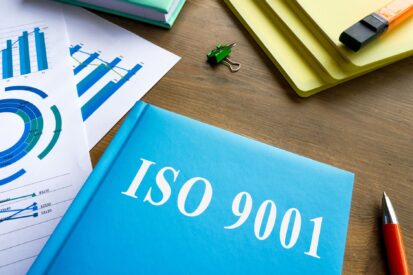In today’s digital era, data protection is a top priority for businesses of all sizes. Organisations must navigate complex regulatory landscapes to ensure the responsible handling of sensitive information, protecting their customers, and maintaining the integrity of their operations. Two principal components of modern data protection efforts are the ISO 27001 standard for information security management and the European Union’s General Data Protection Regulation (GDPR). While they may seem distinct and unrelated, ISO 27001 and the GDPR are, in fact, complementary approaches to safeguarding data – and harnessing the strengths of both frameworks can lead to more robust, resilient information security practices.
ISO 27001 is an internationally recognised standard that outlines best practices for implementing and maintaining an information security management system (ISMS). It offers a comprehensive, risk-based approach to data protection, covering various aspects of information security, including physical and environmental security, human resource security, and business continuity management. On the other hand, the GDPR is a legal framework aimed at protecting personal data and is applicable to organisations operating within the European Union or dealing with EU residents’ data.
Implementing ISO 27001 principles can greatly support GDPR compliance, as the former’s risk-based approach can facilitate the identification and mitigation of possible data protection vulnerabilities. Additionally, the comprehensive nature of ISO 27001 can help ensure that organisations consider all aspects of their information security ecosystem, ensuring no gaps are left that could compromise personal data.
In this article, we will delve deeper into the relationship between ISO 27001 and the GDPR, examining the ways these two frameworks can work together to bolster your organisation’s data protection efforts. We will discuss the advantages of integrating ISO 27001 and GDPR principles, provide guidance on implementing these standards in a coordinated manner, and explore how an ISO 27001-certified ISMS can help you avoid potential pitfalls in the road to GDPR compliance. Join us on this insightful journey as we unlock the potential of merging these two powerhouse data protection frameworks for the benefit of your organisation.
1. Understanding the Key Components of ISO 27001 and GDPR
To appreciate the complementary nature of ISO 27001 and GDPR, it is vital to grasp the essential components of these robust standards. ISO 27001 revolves around three key stages – risk assessment, risk treatment, and continuous improvement – which combine to deliver a comprehensive framework for information security management. Meanwhile, the GDPR is rooted in seven core principles that reflect its purpose and scope, including lawfulness, fairness, and transparency; purpose limitation; data minimisation; accuracy; storage limitation; integrity and confidentiality; and accountability.
Despite their distinct origins and objectives, there is a considerable overlap in the nature and intent of ISO 27001 and the GDPR, making it easier for organisations to integrate these standards holistically.
2. Synergising Information Security and Data Protection: The ISO 27001-GDPR Nexus
To leverage the correlation between ISO 27001 and the GDPR, consider the following strategies for integrating these standards efficiently and effectively:
– Assess and identify the data protection risks: Understand your organisation’s data protection environment and utilise ISO 27001’s risk assessment methodology to pinpoint potential vulnerabilities.
– Address GDPR compliance within your ISMS scope: Define the scope of your ISMS to include aspects relevant to GDPR compliance, ensuring your organisation considers all potential data protection risks when devising its information security strategy.
– Align policies, procedures, and controls: Develop aligned policies, processes, and controls that simultaneously address both ISO 27001 and GDPR requirements, ensuring that your organisation remains compliant with both standards.
– Implement robust incident response and breach notification procedures: The GDPR requires organisations to notify the relevant supervisory authority of a data breach within 72 hours. Integrating this requirement into your ISO 27001 response procedures can ensure a timely and effective response to security incidents.
– Foster a culture of information security and GDPR awareness: Promote a culture of information security and data protection within your organisation with ongoing training and support to ensure employees understand their roles and responsibilities.
3. The Benefits of Integrating ISO 27001 and GDPR Principles
Organisations that successfully coordinate their ISO 27001 and GDPR compliance initiatives can enjoy several tangible benefits, including:
– Enhanced data protection: An ISO 27001-certified ISMS offers a strong foundation for GDPR compliance by covering a broad range of information security scenarios and providing a comprehensive risk management framework.
– Streamlined processes and reduced complexity: Aligning your organisation’s information security and data protection initiatives can simplify compliance management, increase efficiency, and reduce the likelihood of missing critical requirements.
– Improved reputation and customer trust: By demonstrating your organisation’s commitment to data protection and information security excellence, you can foster greater customer trust and set yourself apart from competitors.
– Minimised risk of financial penalties: Ensuring compliance with both GDPR and ISO 27001 requirements reduces the risk of incurring financial penalties associated with non-compliance, as well as the potential reputational damage.
4. Maintaining High Standards in Data Protection and Information Security
To guarantee the ongoing success of your integrated ISO 27001-GDPR compliance efforts, consider the following best practices:
– Regularly review and update your policies and procedures to ensure they remain relevant and effective in addressing current challenges and emerging threats.
– Stay informed about regulatory changes and updates to both ISO 27001 and GDPR requirements, ensuring your organisation remains compliant and adaptable.
– Invest in continuous staff training and development, reinforcing the importance of information security and data protection best practices in the changing landscape.
– Monitor the effectiveness of your integrated ISMS and GDPR implementation, utilising key performance indicators and metrics to track progress and improvements.
Harnessing the Power of ISO 27001 and GDPR Integration
As organisations navigate the increasingly complex and interconnected world of information security management and data protection, the need for robust and adaptable frameworks is undeniable. By integrating the principles of ISO 27001 and the GDPR, businesses can ensure the comprehensive protection of their information assets while efficiently addressing compliance requirements. Our team of ISO consulting experts at ISO 9001 Consultants is here to help you develop and implement solutions that harmonise these two powerful standards, empowering your organisation to thrive in the face of modern-day information security challenges.








Users Comments
Get a
Quote